Inside the Tank | Empirical Brewery
A lot has changed over the past year for Empirical Brewery. They moved to self-distribution, the brewpub, just a stones throw away from the taproom, is in full-swing, and they are moving from bottles to cans. There’s a lot of great beer coming out of the small taproom in Andersonville so we went out there and spoke with CEO Bill Hurley and Head Brewer/Taproom Manager Jacob Huston about Empirical, craft beer in Chicago and the industry in general.

PorchDrinking.com: How did you get into beer?
Bill Hurley: I started in college, I was in DC and one of my work study program jobs was with the national security studies program. As part of that they did a lot of things with the international events, they hosted a lot of people and the guy who was running the program was really into beer. Back then there wasn’t really anything like craft beer in the US so it was all imports.

He would bring in some really exotic stuff and I really got into exploring styles of beer. There was also a place, I would say it was about two miles from campus, I can’t quite remember the name, but it was a craft beer bar before there was such a thing. They had a beer menu that was organized by country and they they did not card very well so I was able to go in and explore their menu on a regular basis. It was fascinating and that was what got me into the whole thing. Years later, when I was looking to become an entrepreneur it made sense to look into the beer industry.
Jacob Huston: I have a lot more typical of a brewer’s response where I started home brewing. A buddy told me he was brewing and so I bought a kit and started home brewing. Later, I realized I could turn this into a living and started volunteering around the city doing as much brewing as I could and sharing as much beer as I could.

I volunteered at enough places that I was able to land a volunteer job here at Empirical. They liked me enough and I moved up and started here full time and tried to prove my worth by making good beer. It’s been a lot of fun learning all the new sides to it (brewing) being here. I learned the basics of brewing and then I moved up and then I started doing the ordering, the inventory, which isn’t as much fun as the brewing itself, but definitely teaches you a lot about what’s going on in this industry.
Bill, you said that you had the entrepreneurial bug, what made you want to open a brewery?
Bill Hurley: At the time that I was starting to research this, it was 2007-2011 that I was doing research. It was 2011 when I pulled the trigger on starting to look for a place, start to raise the funding, writing a business plan, doing the financial models, all that fun stuff. I put a lot of work into it.
What made me want to do it was it was a dynamic industry and it was a product that I knew a lot about and really loved. It was definitely the right path for me if I was going to start my own business. From one path it’s a very difficult business to start. It has a lot of upfront costs and those tanks are not cheap. I think it was one of those things that if you do enough work on the backend you gain some confidence. It was only when I came up for the concept of Empirical, which is constant experimentation and constant improvement, that I decided to pull the trigger. I wasn’t going to do it if I decided it was just going to be another brewery on the market.

Talk about that motto, “Constant Experimentation and Constant Improvement.” How do you guys embrace that today?
Bill Hurley: From my perspective it’s providing the one barrel system in the taproom to experiment with.
Jacob Huston: The best way to put it is that it’s there for experimentation. I brewed the same recipe on that same system I don’t know how many times and it keeps turning out a little bit different. It’s to the point where you really just want to hone in on what you’re doing and get that final flavor profile that you’re looking for, all breweries do that for the most part.
What sets us aside is that we take those beers that we brew on that system and put them on tap at the taproom. We let the customers talk through it with us and give us all their feedback. We have surveys for them to fill out, we try as hard as we can to involve the whole community. If you come in, you can try a flight of four of the same beers but each one with a slight tweak and we take all that feedback and we brew another batch. You can come in and keep tasting it and seeing it’s progress and eventually we’ll put it to market. It’s kind of fun to say that you had a part in the final recipe. It’s kind of interesting to see what people are working on, especially when we’re out here with the customers.
How did you come up with the name Empirical?
Bill Hurley: So the concept came first. Again, we came up with this idea that we’d be constantly experimenting so I had decided on a science theme. For me, science is fun and when we’re thinking about that experimentation that we’re doing it the name kind of just popped in my head. My first thought was that people are not going to know how to spell it. It’s not exactly a fun name necessarily, but it really does embody what we’re doing here and to me it made perfect sense. I knew we had the name for the brewery.
There’s a story behind the brewery’s logo. Talk about that.
Jacob Huston: Essentially there were these ancient stone tables that were found way back in 3000 BC and they kept finding the same symbol written across these stone carvings. Eventually when they figured out what they said, it was an actual brewing process. The vessel they kept seeing over and over again was a fermentation vessel. It’s comical, it looks like a “V” and the bottom of that was in the ground. Half of that vessel was below ground and because of that they were a lot more capable of controlling the temperature and not letting it get too hot. That’s where the logo came from, at least the comical vessel we made it look more like an “E” to fit the brand.

How does Empirical stay front of mind in a city that has so much beer?
Bill Hurley: A lot of it is the room you’re sitting in. We pride ourselves on a couple of things. The first is making great beer. The second is having that community around us and having them involved in our process. It goes back to that idea of constant experimentation, but more importantly constantly involving the community in that process.
I always said early on when I was starting the place, you can make great beer with great equipment and a great brewer but you might just be making an American-style Pilsner and your sales are just going to plummet every year…obviously referring to Budweiser and Miller. The reality is that you can make great beer but you don’t necessarily know what people want to drink. They don’t necessarily know what they want to drink. We’re constantly doing new styles as you can see from the board. Anytime you come in here you’re likely going to see a similar board where it’s just very different styles across the entire gamete of colors, ABVs, IBUs, everything.

These guys love experimenting with new stuff. What makes us stand apart is involving the community and we embrace that here in the taproom and the brewpub for that matter. I think a lot of our customers feel like they’re part of the family. We try to make sure that when someone comes in here they’re greeted and that they feel at home and they always feel welcome. More importantly, we try to nerd them up with beer knowledge before they leave.
You recently switched from a distributor to self-distribution here in Chicago, what was the thought process behind the switch?
Bill Hurley: It was a tough choice. We had a long relationship with Chicago Beverage and a number of other distributors and I think the last few years the Chicago market especially at the distribution level has been very oversaturated. I think we were just too small to really get noticed in their portfolio. It was really tough on us, we weren’t selling too much product and we were losing money every month on it. We couldn’t really sustain it any longer.
We were kind of forced into the decision in that respect. To be honest I’m looking very much forward to self-distribution. We have a lot of accounts that we’ve personally developed over the years with our sales team and this will make us a little closer to those accounts. We’ll know exactly what they’re doing with the inventory, we’ll know whether or not they have a tap handle, we’ll be able to connect with them, and get feedback from them as well as pull empty kegs and replace them. I think it will tighten the relationships which is what we’ve been looking for for a long time. We’re not looking to be a huge brewery, we just want to be a high quality brewery and that relationship needs to take center stage for us and the only way we’re going to be able to do that is by connecting directly with the consumer.
Science plays a big role in beer, brewing is a science, how do you guys come up with new ideas for beer?
Jacob Huston: Sometimes I don’t try and think of new ideas, sometimes they just click. We were talking about the kettle sour, I’m a huge sour fan and we weren’t able to do that here at first. So I did some research and I knew there were other ways of souring without using some of the strains of yeast that will really containment things so we just did as much research as possible and came up with ways that we could work with our system.
We usually come up with the style that we’re going to make and then we just really nerd out on names which is a lot of fun. We like to sit down and just throw names at each other and logos and designs. We do a new firkin every week and it’s kind of a struggle to come up with a name every week that we think is clever and unique. When I think for ideas, I do think science first and I always enjoyed science class and chemistry growing up.
You recently moved to cans. Why?
Jacob Huston: We knew we were moving to self-distribution and wanted to implement some new beers and we said “let’s keep with that rebranding for everything, but instead of redoing the logos for the bottles, let’s just move to cans since we wanted to do that anyways.”

We’re very happy with how the first set of cans went. We got a lot more coming out. By craft beer week we’ll have all four of our cans out. We’ll be moving pretty quickly away from all the bottling.
Bill Hurley: Our brand has really developed the last few years. When we were first coming up with the concept and everything, we came up with the logo, we came up with the name, we knew the corporate colors, we knew the tagline but that doesn’t tell you what the brand is really going to be. You only know that when you start putting out that product and it starts getting a reception.
We’ve kind of learned what our brand is over the last two years, what we’ve realized is that it’s a very straight forward, very clean image that we’ve established. The old packaging didn’t really reflect that at all. It was science, it was fun, we put the equipment on the packaging and everything else, but it doesn’t really fit our brand anymore. When he (Jacob) was talking about changing up the beer lineup to include the sour and launch a new pale ale and IPA, it made a lot of sense to just completely start from scratch. The only thing that allowed us to make that decision was the availability of the mobile canning service. We obviously do not have the money to buy a very expensive canning line so we went from making the decision to move to cans to actually having the product in six weeks.
A lot breweries have cats, but the Empirical brewery cats are famous. How did that happen?
Bill Hurley: It’s weird, we started getting contacted by the media after we adopted them from the feral cat program here in Chicago. It’s been so successful in keeping rodents out of our building. It’s not just killing them, they don’t even come in the building. It’s been a great success from that stand point and we also really enjoy their company and that comes across to people. We got picked up by some local media and then CNN.com put us on their website and then the Wall Street Journal, they’ve been in the Nikkei News, Bolivian Nightly News, Toronto Airport Magazine, they really are world famous – it’s kind of bizarre.
I had somebody reach out from Japan that a newspaper was running photos in one of the stories about the cats and that they hadn’t gotten permission. I was like “good for them,” I’m not going to sue them over it. It’s something every brewery should look into if they haven’t already.
In 2018 what’s one trend in craft beer you expect to see?
Jacob Huston: This year it seems to be the hazier the better. They’ve already done the triple IPA, interested to see when the quadruple IPA comes out. Sours have made a resurgence but I don’t know how long that will last. People are turning back towards traditional styles, some lighter lagers, more hop experimenting and that’s why it makes it so hard to predict. There are so many new hop varieties coming out that there’s so much new experimentation going on. You make it your own. We have East Coast, West Coast and now the Midwest has No Coast. Every place will have their own style and soon every city will have their own style. Every region will have it’s own fun.

Bill Hurley: From the business side of things, I’ll predict that you’ll continue to see a lot of acquisitions and mergers. Those will range supreme. You won’t see Empirical getting purchased by the way. I did tell all of our investors that this was built to be a 100 year company meaning we’re here for the long haul. We don’t ever want to get that big and we always want to be that local craft brewery that’s here for everyone.
I think you’ll see a lot of companies our size succeed so long as they have a tap room, so long as they have a brewpub and they have that connection to the end market directly. Distribution is a hot mess. You will definitely see consolidation on the retail side and you’ll continue to see great innovation in the craft world but it’s going to get rough for the companies that don’t have that source of cash flow with a taproom or brewpub. It’s still rough out there even for folks like us who do have those things. It’s a very tough market and you’ll see bankruptcies rise for the smaller guys and I think Budweiser and Miller will keep consolidating the industry.
Leading me into my next question – is the buying up and consolidating of smaller breweries a good thing?
Bill Hurley: There’s a good way and there’s a bad way to do acquisitions. I’ve seen some very bad ways to do them, without naming names, I’ve been in meetings with some of these larger firms that are doing the acquisitions and a lot of the reasoning they will use, and this is what you watch for when looking for a bad acquisition, a lot of their reasoning is that they want to fold one of the products into one of their existing lines. Beer “A” will fit perfectly in our wheat lineup and that’s why they want to buy the company. In reality, they plan on dismantling it and eliminating the source of competition.
Then you see acquisitions where they come in and they sort of stay hands off, they supply the funding and the corporate level knowledge and organization that the smaller company probably desperately needs. Those are the good ones. Those are the ones that will actually work. Typically they take a 51% position in the company and they’ll let the people who know what they’re doing in the company keep doing it and they’ll stay hands off and look for a report every month. You see both and that’s how you identify the good and the bad.
Jacob Huston: He pretty much nailed it as that goes. I do see a lot more coming in terms of buyouts and acquisitions. There are so many people building breweries now that I bet for some that’s their end goal. We all have the love of beer and I’ll never deny anyone their love of beer. But just because you have a love for beer doesn’t necessarily mean it’s worth opening a brewery. Especially when some of the people that are opening a brewery aren’t even the ones running it.
What made you want to get the brewpub up and running?
Bill Hurley: We’ve had a lot of success here. The neighborhood loves us and we love them and we were looking for another similar situation. An attorney who was working on a project for the owner of that property on Morse Ave is a regular here, he threw out this idea of taking over a space that had already been a restaurant/bar. They were looking for someone with a brand who was looking to embrace the neighborhood, be a part of it and give back to the community and we were looking for a space that we could jump into without a major buildout or substantial licensing risks.

Now I did not want to get into food. That was not in the original plan, but we had the knowledge in-house to do that. Even though I was completely terrified of the prospect of doing food, the reality is we had the right people to pull it off and more importantly, it fit with our concept which was to explore the science of beer. A lot of the food there includes our beer. We are also able to do beer cocktails there which we cannot do here (taproom) because of our licensing. Overall it was just a situation where it was just the perfect situation for the two parties. I also really love that neighborhood. I lived in Edgewater for 12 years. I know the history of Rogers Park and I know how great of a neighborhood it’s becoming now and we can be apart of that and it’s really important to me. We want to have a positive impact on the people. Whether it’s the people working there, who live there or the people who come by your place and visit the neighborhood.
Give me your favorite style of beer, favorite Empirical beer and, if you’re not drinking Empirical, what are you drinking?
Bill Hurley: Double IPA is my favorite style and obviously Double Helix is my favorite Empirical beer, although it’s a close second for Phase Transition. I love imperial stouts and it’s pretty close to a stout being a robust porter. When I’m not drinking Empirical I’m drinking water or coffee. If it’s another beer I’ll look for a local Chicago beer, especially one of the Malt Row guys.
Jacob Huston: My favorite style is more of a range. I’d say sours, and while I don’t like all sours, if you have one on the menu, that’s the first thing I’ll order. My favorite Empirical beer is Heliotropic. It has a nice balance of the juicy hop characteristics I enjoy and it’s light and still really refreshing. When I’m not drinking Empirical, it’s hard, I usually drink sours, but I like trying everything new.
What does 2018 hold for Empirical?
Bill Hurley: It’s off to a roaring start so far. Going to self-distribution is the biggest thing for us this year. Moving to cans is a part of that and then launching these new beers is big for us. The taproom has been in a groove for us these past couple of years so we’re constantly changing something in here, but it’s not taking a ton of our energy here. The focus here will really be on the distribution side and re-establishing relationships with our vendors in Chicago.

Jacob Huston: I’m looking forward to 2018 because we really finally hit our stride and figured out our brand and now we’re pushing really heavily with that. You’re going to see a lot more of us in the market and hear about us a lot more. We’re going to have so many more releases with all these cans that are coming out and I have 10-15 variations of barrel-aged beers that will be released by the end of the year. There’s a lot of new stuff that we don’t typically do. We’re going to sell our first bottled barrel-aged beer as well. We’ll have a lot of fun stuff coming out and I think that’s what people are looking for.


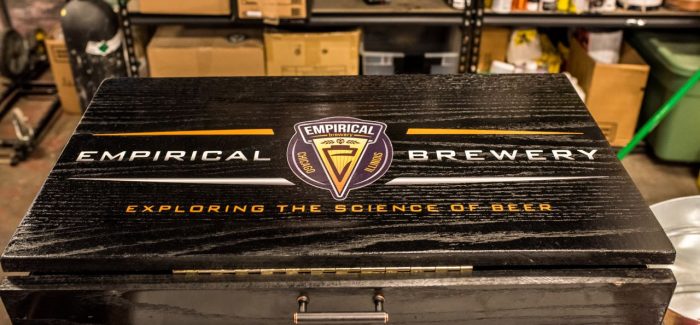

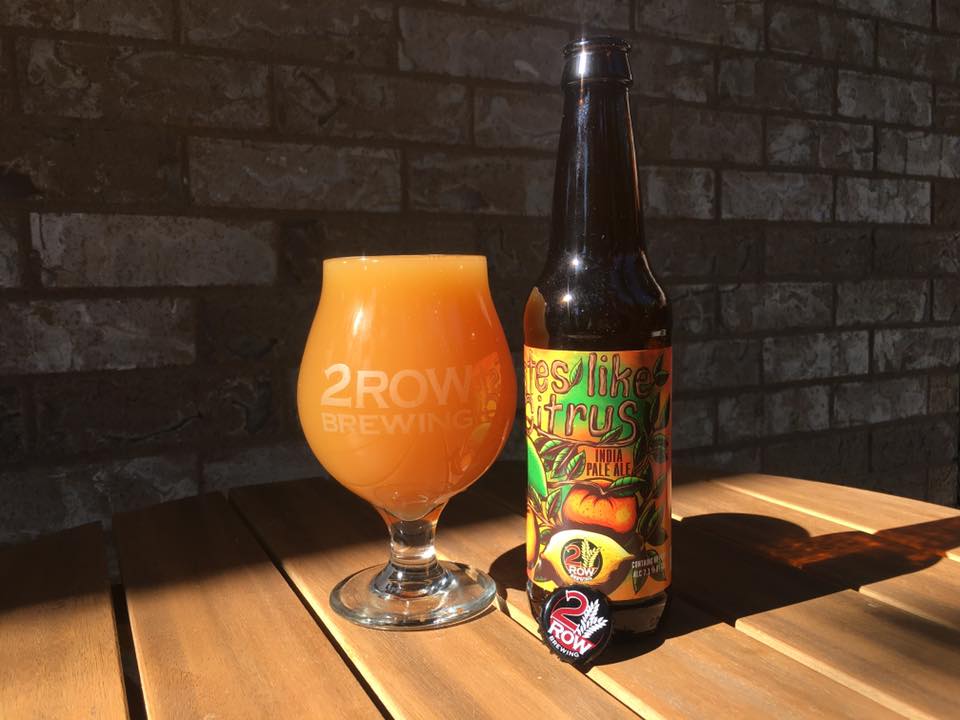
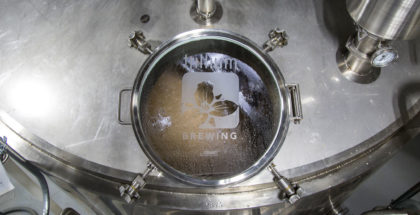
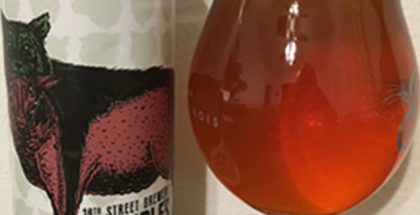
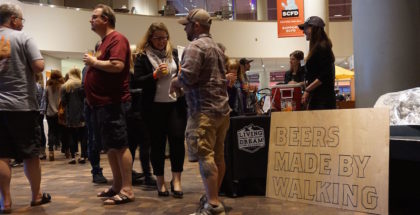
Submit a Comment